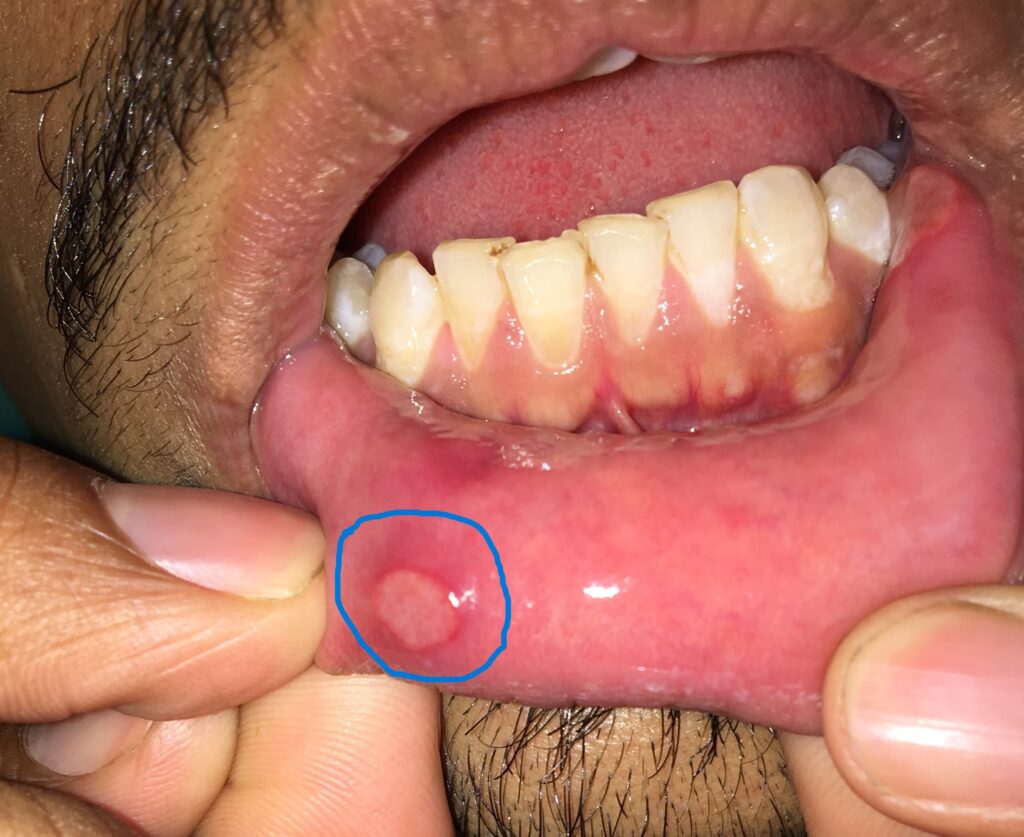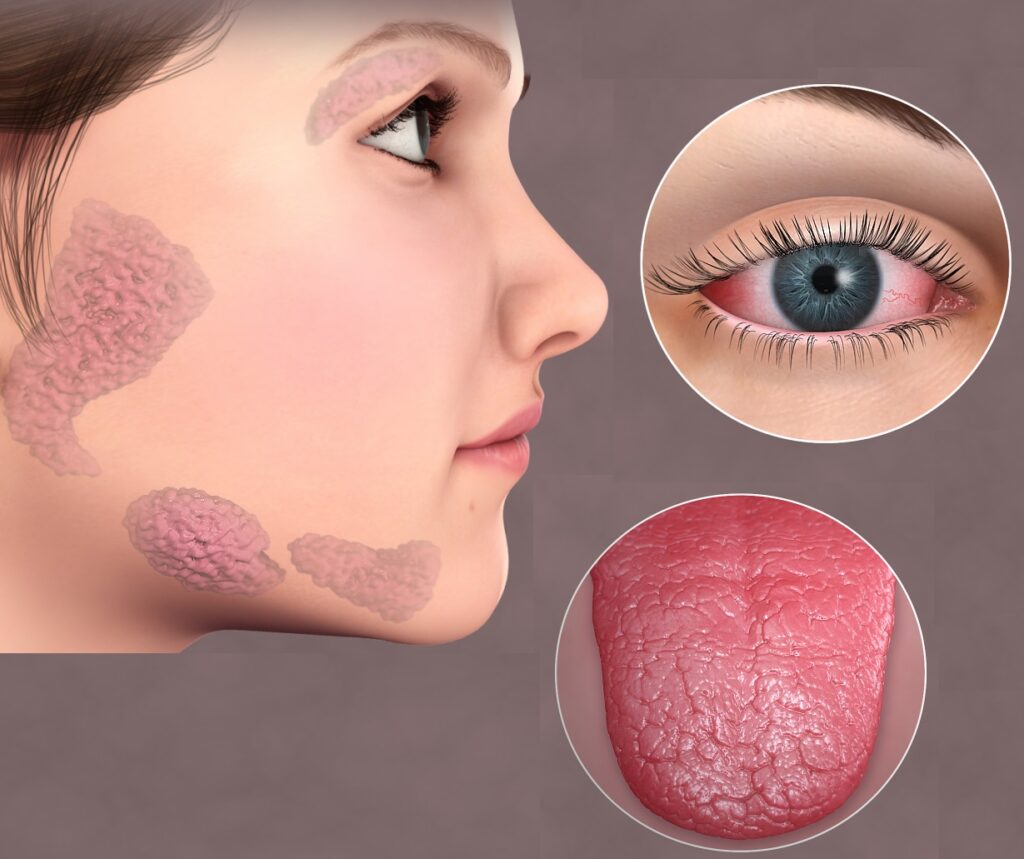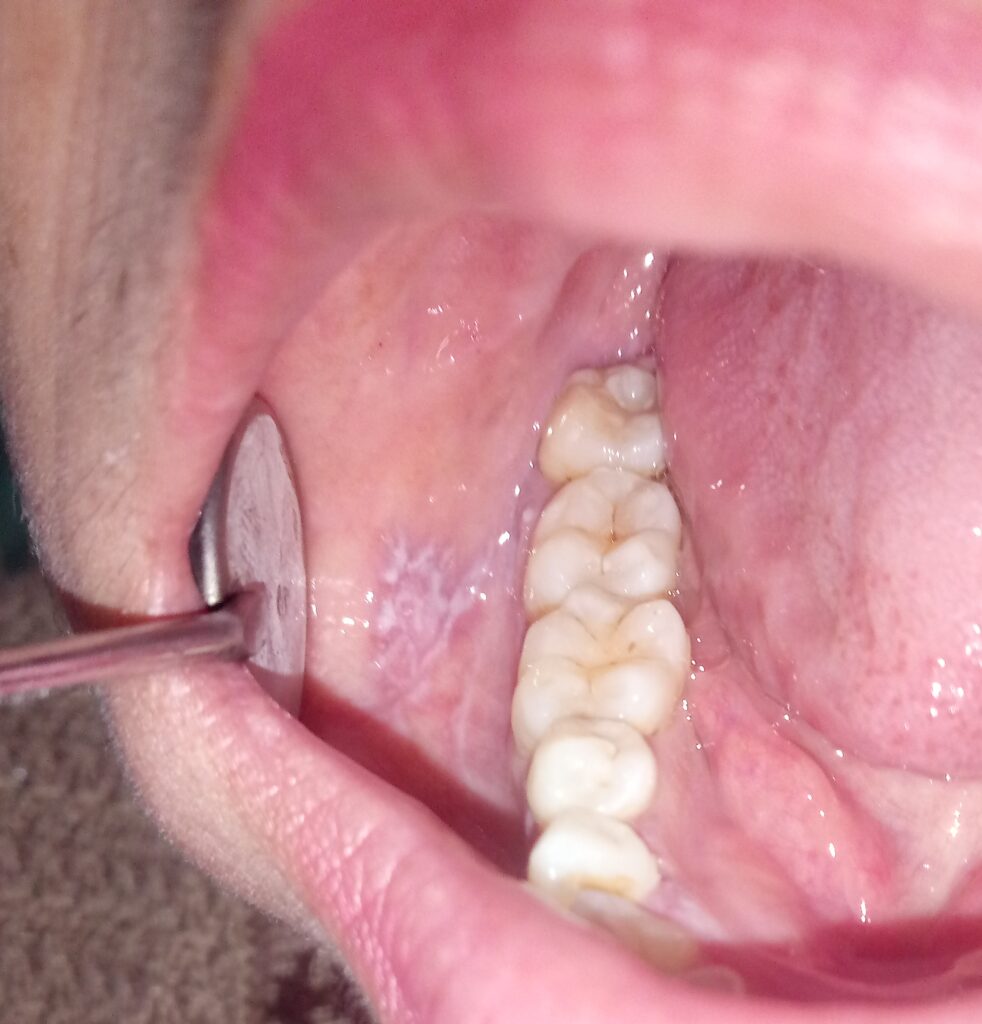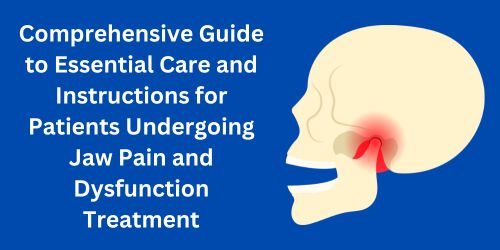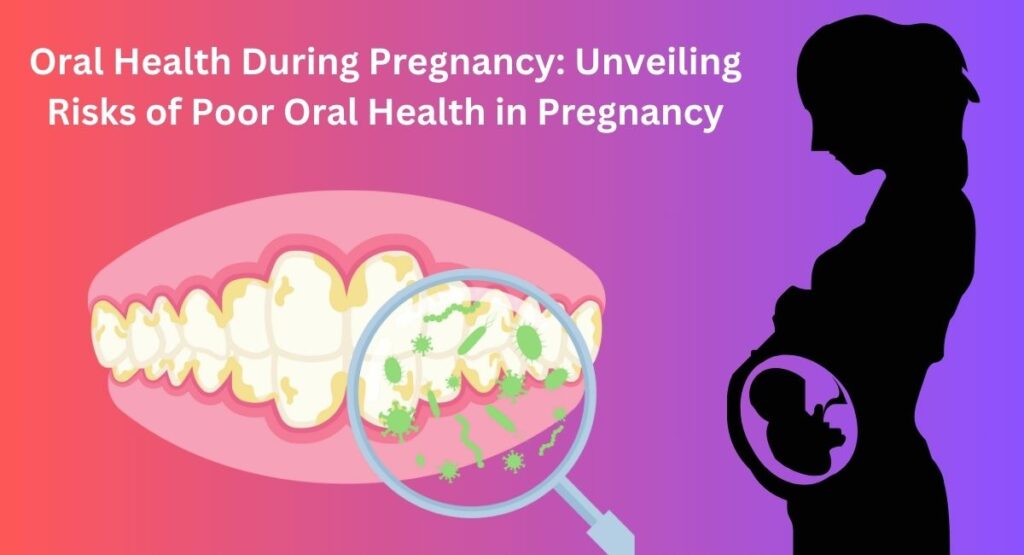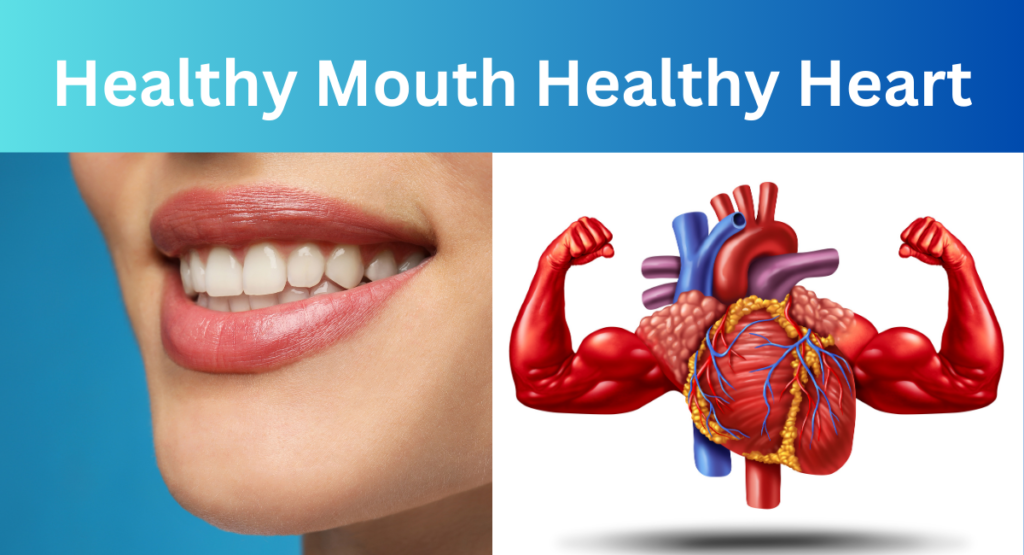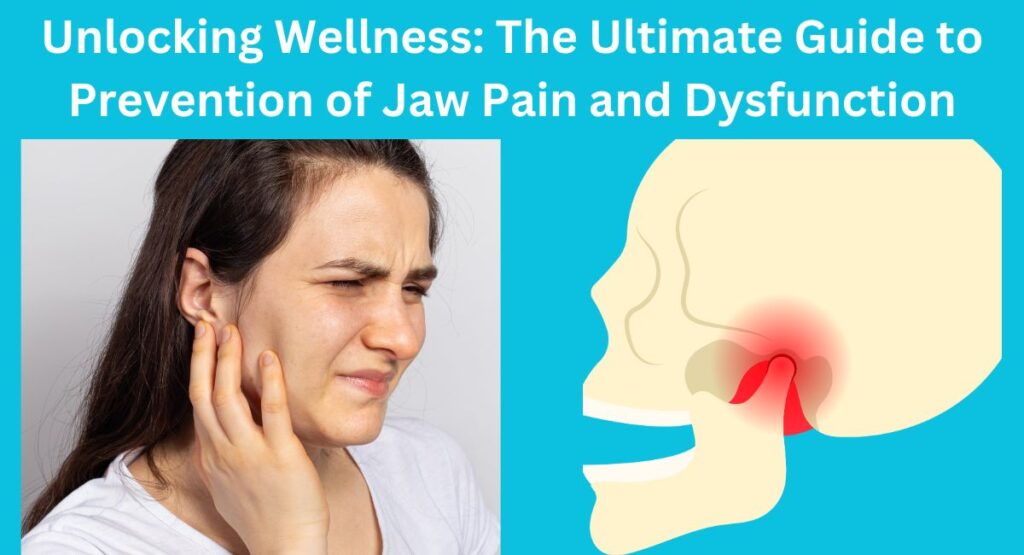
Prevention of Jaw pain and dysfunction
Welcome to a comprehensive guide dedicated to the prevention of jaw pain and dysfunction, where we delve into essential strategies for maintaining a healthy and pain-free jaw. In our daily lives, factors such as stress, habits, and even posture can contribute to discomfort in the jaw region. Join us as we explore practical tips and expert advice to safeguard your jaw health and embrace a life free from the challenges of jaw pain and dysfunction. From stress management to oral hygiene practices, we’ve got you covered with actionable insights to ensure your journey towards a pain-free jaw is smooth and effective. Let’s embark on this wellness journey together, taking proactive steps to prevent and alleviate jaw-related issues.
What is Temporomandibular Disorder (Jaw Pain and Dysfunction)?
Temporomandibular Disorder (TMD), commonly known as jaw pain and dysfunction, refers to a condition affecting the temporomandibular joint (TMJ) and the surrounding muscles that control jaw movement. This disorder encompasses a range of symptoms, including pain or discomfort in the jaw joint, difficulty in jaw movement, and associated issues such as headaches, facial pain, and clicking or popping sounds during jaw motion.
TMD can arise from various causes, including stress, teeth clenching or grinding (bruxism), poor posture, dental misalignment, and other factors outlined in the provided article. The complexity of TMD highlights the interconnectedness of emotional, behavioral, and physical factors in contributing to jaw pain and dysfunction.
Individuals with TMD may experience pain while chewing, talking, or even at rest. In some cases, the discomfort can extend to the neck and shoulders. Understanding the diverse causes of TMD is crucial for effective prevention and management, involving strategies ranging from stress reduction and behavioral changes to dental interventions and lifestyle modifications. Early awareness, proper diagnosis, and targeted interventions are key to alleviating symptoms and promoting long-term jaw
Causes of Jaw Pain and Dysfunction
Understanding the causes of jaw pain and dysfunction is crucial for effective management and prevention. Identifying the root causes enables tailored interventions, reducing the risk of disease progression. By addressing specific triggers early on, individuals can save both time and money, promoting overall well-being and preventing the development of chronic conditions. Early awareness empowers individuals to adopt preventive measures and seek timely interventions, fostering long-term jaw health. Please review the detailed causes of jaw pain and dysfunction in our article titled ‘Causes of Jaw Pain and Dysfunction.’
1. Stress and Anxiety:
- Emotional stress can lead to jaw tension and clenching.
- Teeth clenching and grinding during sleep due to anxiety can cause micro-injuries.
- Temporomandibular Disorder (TMD) can result from a stress-pain-stress cycle.
2. Jaw Clenching and Bruxism (Teeth Grinding):
- Habitual clenching or grinding of teeth during sleep.
- Factors include stress, anxiety, anger, boredom, sleep disorders, malocclusion, or missing teeth.
- Bruxism exerts excessive pressure on jaw muscles and joints, causing pain and dysfunction.
3. Excessive Mouth Opening or Closing:
- Sudden or repeated excessive mouth opening, often due to accidents or clenching.
- Excessive closure may result from adverse habits, severe teeth wear, tooth loss, detrimental habits, or chewing on hard foods.
- Excessive opening may occur during dental procedures, over-filling the mouth, or yawning.
4. Malocclusion (Misaligned Bite):
- Crooked teeth or overbites can disrupt the natural balance of the jaw.
- Misalignment leads to uneven pressure on teeth and the jaw, causing chronic pain.
5. Wisdom Tooth Complications: Impact on TMJ and Muscles:
- Abnormally positioned wisdom teeth strain the temporomandibular joint (TMJ).
- Misaligned or impacted wisdom teeth contribute to chronic jaw pain and dysfunction.
6. Unequal Jaw Use During Chewing:
- Chewing on one side unevenly distributes load on jaw joints.
- Balanced jaw usage during chewing maintains joint health and oral hygiene.
7. Dental Issues:
- Tooth decay, abscesses, or gum disease can cause jaw pain.
- Regular dental care and check-ups are crucial for identifying and addressing these issues.
8. Injury or Trauma:
- Significant or repeated injuries, like accidents, falls, or biting into hard foods, can lead to jaw pain.
- Trauma can result in fractures or dislocations, causing acute or chronic dysfunction.
9. Excessive Talking or Prolonged Speech:
- Extensive talking, especially in certain professions, may contribute to jaw pain.
- Irregular or sudden episodes of excessive talking can strain the jaw without proper management.
10. Deleterious Habits: Chewing Gum:
- Excessive gum chewing causes recurrent micro-trauma to the temporomandibular joint (TMJ).
- Over time, this habit can lead to jaw discomfort and complications.
11. Unexpected Physical Strain: Weight Lifting and Heavy Exercise:
- Unpracticed weight lifting or strenuous exercise can lead to teeth clenching and jaw muscle strain.
- Proper exercise techniques and awareness of jaw health are essential during physical activities.
12. Jaw Manipulation Habits:
- Unconscious habits like excessive jaw movement or clicking can stress the TMJ.
- Recognizing and addressing these habits is crucial for preventing jaw pain and dysfunction.
13. Postural Strain:
- Poor posture while sleeping or sitting can strain the TMJ and head/neck muscles.
- Maintaining good posture helps prevent jaw discomfort over time.
14. Chronic Ear Infections:
- Persistent ear infections can contribute to Temporomandibular Disorder (TMD) and jaw pain.
- Seeking medical attention for both ear infections and resulting jaw discomfort is essential.
15. Bone Diseases: Arthritis:
- Arthritis, such as rheumatoid or osteoarthritis, can occasionally affect the TMJ.
- TMJ involvement is relatively infrequent, emphasizing the unique nature of TMJ-related jaw pain causes.
Prevention Strategies for Jaw Pain and Dysfunction
Explore a proactive approach to maintaining optimal jaw health through preventive strategies for jaw pain and dysfunction. Learn effective habits, lifestyle adjustments, and self-care practices that can play a crucial role in averting potential issues and promoting long-term well-being. Discover how simple, daily measures can contribute to a pain-free and healthy jaw, empowering you to take charge of your oral health.
Please review the essential care and instructions provided for patients undergoing treatment for jaw pain and dysfunction in our article titled ‘Comprehensive Guide to Essential Care and Instructions for Patients Undergoing Jaw Pain and Dysfunction.
Stress and Anxiety:
- Practice stress management techniques, such as deep breathing, meditation, and mindfulness.
- Consider seeking therapy or counselling for anxiety and stress reduction.
- Use relaxation techniques to prevent jaw clenching, especially during sleep.
Jaw Clenching and Bruxism:
- Employ stress reduction methods to address underlying causes.
- Wear a nightguard or splint as recommended by a dentist to protect teeth during sleep.
- Identify and address triggers such as anxiety, anger, or frustration.
Excessive Mouth Opening or Closing:
- Be mindful of habits like clenching, bruxism, and overuse of the jaw.
- Practice proper dental hygiene to avoid complications.
- Seek prompt dental intervention for issues like severe teeth wear or misalignment.
Malocclusion (Misaligned Bite):
- Consult with a dentist for assessment and correction of dental misalignment.
- Consider orthodontic treatments for correcting crooked teeth or overbites.
Wisdom Tooth Complications:
- Regular dental check-ups to monitor wisdom teeth development.
- Address impacted or misaligned wisdom teeth promptly through dental procedures.
Unequal Jaw Use During Chewing:
- Ensure balanced use of both sides of the jaw during chewing.
- Maintain good oral hygiene to prevent tartar accumulation on one side.
Dental Issues:
- Practice good oral hygiene, including regular brushing and flossing.
- Attend routine dental check-ups for early identification and treatment of issues.
Injury or Trauma:
- Use caution to avoid biting into hard foods or using teeth for tasks other than chewing.
- Wear protective gear during activities with a risk of facial trauma.
Excessive Talking or Prolonged Speech:
- Take breaks during extended periods of speaking.
- Practice jaw exercises to maintain flexibility.
Deleterious Habits: Chewing Gum:
- Limit the frequency and duration of gum chewing.
- Be mindful of the potential impact on jaw health.
Unexpected Physical Strain: Weight Lifting and Heavy Exercise:
- Maintain proper form during exercise to minimize jaw strain.
- Be aware of teeth clenching during intense physical activity.
Jaw Manipulation Habits:
- Be conscious of unnecessary jaw movements or clicking.
- Seek professional guidance to address and correct harmful habits.
Postural Strain:
- Maintain good posture while sitting and sleeping.
- Avoid jaw protrusion or movement while maintaining poor posture.
Chronic Ear Infections:
- Treat ear infections promptly to prevent potential impact on the temporomandibular joint.
- Consult both dental and medical professionals for comprehensive care.
Bone Diseases: Arthritis:
- Manage systemic conditions like arthritis under medical supervision.
- Be aware of any jaw-related symptoms and consult healthcare providers promptly.
Conclusion
Prioritizing the understanding and awareness of the diverse causes of jaw pain and dysfunction lays the foundation for effective prevention and management strategies. By addressing these triggers early on, individuals can proactively safeguard their jaw health, ultimately saving both time and resources. Cultivating a proactive approach, along with timely interventions and a focus on overall well-being, becomes paramount in fostering long-term jaw health. Embracing this comprehensive understanding empowers individuals to take charge of their oral and emotional well-being, paving the way for a life free from the constraints of chronic jaw pain and dysfunction.
FAQs
FAQ: Can jaw pain be solely related to poor posture?
Answer: Poor posture is mentioned in the article as a potential contributor to jaw pain. However, specific details on how postural strain influences jaw discomfort are not extensively covered. Individuals are encouraged to maintain good posture to mitigate potential adverse effects on jaw health.
FAQ: How do chronic ear infections contribute to jaw pain?
Answer: The article briefly mentions the connection between chronic ear infections and Temporomandibular Disorder (TMD). Further information on the mechanism of this contribution and its impact on jaw health could provide a more detailed understanding.
FAQ: Is there a link between excessive talking and jaw dysfunction?
Answer: The article touches upon excessive talking as a potential cause of jaw pain but does not delve into the specifics. A more detailed explanation of how prolonged speech may lead to jaw dysfunction could be beneficial.
FAQ: Can jaw manipulation habits develop without conscious awareness?
Answer: The article mentions jaw manipulation habits but does not explicitly address whether these habits can develop unconsciously. Providing insights into the unconscious development of such habits would offer a more comprehensive understanding.
FAQ: How does wisdom tooth misalignment impact the temporomandibular joint (TMJ)?
Answer: The article discusses wisdom tooth complications contributing to jaw discomfort but does not elaborate on how misaligned wisdom teeth specifically affect the TMJ. A more detailed explanation of this connection could enhance reader comprehension.


